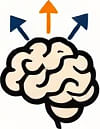Practical Drills for an Adaptive Mindset
 by Marlene Keeling
by Marlene Keeling
Discover effective strategies and drills to cultivate an adaptive mindset, empowering you to take control and thrive in various situations. Learn how simple practices can build resilience and drive personal growth for ambitious professionals.
Adaptive mindset practices are essential for anyone aiming to lead a proactive life. These approaches help individuals respond effectively to change and maintain control over their decisions. By focusing on adaptive mindset, you can enhance your ability to face new challenges with confidence.
Start by incorporating simple daily drills into your routine. For instance, begin each morning with a five-minute reflection exercise. This involves writing down one goal for the day and outlining potential obstacles. Such routines build a foundation for consistent progress and foster a sense of agency in your actions.
One key strategy is the "what-if" drill. This practice encourages you to anticipate different scenarios and plan responses in advance. Imagine a work project that might face delays; think through alternative steps to keep moving forward. By regularly engaging in this exercise, you train yourself to stay flexible and in charge during unexpected events.
Another effective method is role-playing common difficulties. Gather a friend or use self-talk to simulate challenging conversations or decisions. For example, practice handling rejection in a job application process. This drill sharpens your emotional responses and reinforces your capacity to act decisively.
Building Habits Through Repetition
To solidify these practices, repetition is crucial. Set aside time each week to review your progress. Keep a journal where you note successes and areas for improvement. This ongoing process helps embed adaptive practices into your daily life, making them second nature.
Consider combining physical activity with mental drills. A short walk while brainstorming solutions to a problem can clear your mind and spark creativity. This combination not only boosts your physical health but also strengthens your mental agility.
Group activities can amplify these efforts. Join a community or online group focused on personal development. Share experiences and learn from others who are also working on their growth. Engaging with like-minded individuals provides motivation and new insights into effective strategies.
Overcoming Setbacks with Targeted Exercises
Setbacks are inevitable, but they don't have to derail your path. Use targeted exercises to bounce back quickly. For example, the "reframe technique" involves taking a negative event and viewing it from a different angle. If a plan fails, ask yourself what lessons can be learned and how to adjust moving forward. This exercise promotes resilience and keeps you focused on solutions.
Breathing drills offer another practical tool. In moments of stress, practice deep breathing for a few minutes to regain composure. This simple act allows you to pause, assess the situation, and choose your next step with clarity.
Track your improvements over time. Use a simple chart or app to monitor how often you apply these strategies. Seeing tangible progress can be incredibly motivating, encouraging you to persist and refine your approaches.
Integrating Adaptive Mindset into Professional Life
In your career, an adaptive mindset can lead to greater opportunities. Professionals often face shifting priorities, so applying these drills helps maintain productivity. For instance, during team meetings, practice active listening and quick adaptation to new ideas. This not only improves collaboration but also positions you as a reliable leader.
Make it a habit to end your workday with a quick review. Identify what worked well and what could be adjusted for tomorrow. Such routines ensure that you are constantly evolving and taking ownership of your professional development.
For those in leadership roles, teaching these practices to your team can create a more dynamic environment. Lead by example, demonstrating how adaptive strategies lead to better outcomes and collective success.
Long-Term Benefits and Action Steps
Over time, these practices yield significant benefits. You may notice increased confidence, better decision-making, and a stronger sense of control in various aspects of life. The key is consistent application and a willingness to experiment.
To get started, choose one or two drills from this article and commit to them for the next month. Track your experiences and adjust as needed. Remember, building an adaptive mindset is about taking deliberate steps toward your goals, empowering you to shape your future.
By prioritizing these strategies, you position yourself for ongoing success and fulfillment. Embrace the process, stay committed, and watch as your efforts transform your approach to life's challenges.
